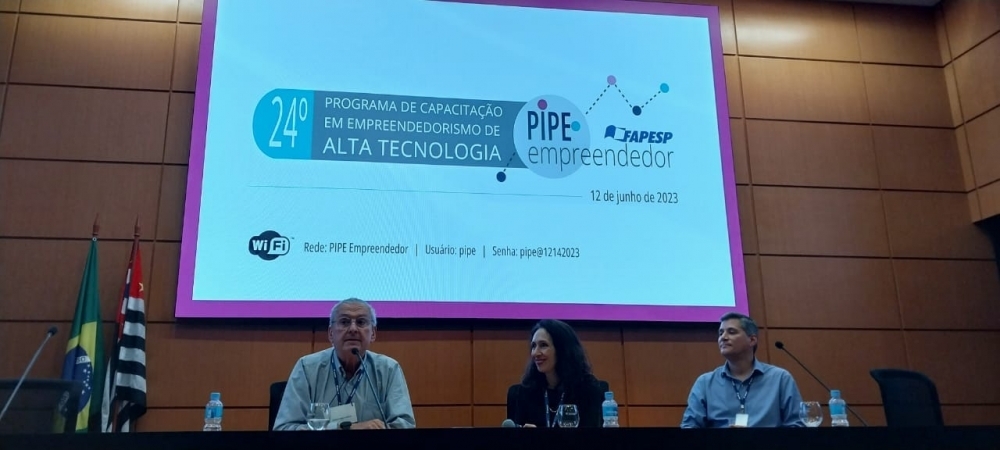


A novel methodology used in the 24th edition of the PIPE High-Tech Entrepreneurial Training Program will guide 21 innovative startups in the process of developing customers and refining their business models, among other competencies (photo: Alberto Ozolins, Cátia Favale and Vitor Mondo during the event held in FAPESP’s auditorium; credit Anapatrícia Morales Vilha)
Published on 07/03/2023
By André Julião | Agência FAPESP – Development of tests for new drugs, an oral vaccine against SARS-CoV-2, batteries that use niobium and graphene, a 3D-printed biodressing containing stem cells, a tool to diagnose skin cancer using infrared light, and a platform for diagnosing and managing data on diversity, equity and inclusion in business organizations – these are some of the proposals presented on the first day of the 24th edition of the PIPE High-Tech Entrepreneurial Training Program (PIPE Entrepreneur) at FAPESP on June 12. PIPE is the Portuguese-language acronym for FAPESP’s Innovative Research in Small Business Program. The training program continues until August 21, helping participants improve their business models and prospect for customers.
The 21 startups that are participating in PIPE Entrepreneur will have a better chance of winning approval for their projects in Phase 2 of PIPE, which involves full development of the research project, and offering the market innovative products at a later stage.
“This is a novel format for PIPE Entrepreneur, in which FAPESP is implementing its own methodology in line with entrepreneurship on a global scale,” said Anapatrícia Morales Vilha, a professor at the Federal University of the ABC (UFABC) and a member of FAPESP’s Adjunct Panel on Research for Innovation, during the opening session of the training program.
“FAPESP is a public institution, and its investment in research funding is paid for by citizens via taxes. It’s therefore important that the startups it supports become profitable businesses that create jobs and also pay taxes, fueling a feedback loop for the system,” said Cátia Favale, a member of FAPESP’s Research for Innovation Area Panel and moderator for the event.
The 21 firms selected for the 24th cycle are proposing applications in healthcare, agriculture, logistics, administration and environmental management, among other areas. “For the time being, you’re startups. We want you to become full-fledged business organizations,” said Vitor Mondo, also a member of the Research for Innovation Area Panel and a researcher at the Digital Agriculture unit of the Brazilian Agricultural Research Corporation (EMBRAPA).
Alberto Ozolins, another member of the Research for Innovation Area Panel, stressed the importance of the 100 interviews with prospective customers to be conducted by each participant in order to improve or reformulate their business model. He also talked about the need for dialogue among the entrepreneurs themselves. “It often happens that a few of you have a problem someone else has already solved. That's why it’s important to talk to each other and swap experiences,” he told the participants.
Novel approach
As of this cycle, the 24th, FAPESP has adopted an internationally recognized training methodology for tech startups developed by the Massachusetts Institute of Technology (MIT) and National Science Foundation (NSF) in the United States. The FAPESP approach considers the project as the core of any entrepreneurial strategy for building the business, finding customers, and establishing organizational and financial routines. It also includes such well-known tools and concepts as Lean Launchpad, Disciplined Entrepreneurship, Entrepreneurial Strategy, and the basics of the NSF’s I-Corps program.
According to the organizers, the methodology has been “tropicalized” so as to be aligned with Brazil’s entrepreneurial culture and the profile of the startups supported by FAPESP. The program has also been supplemented with subject matter that interests the entrepreneurs involved and was required when they submitted their projects for PIPE Phase 2.
The novelties include more training hours, group dynamics, and practical activities to learn in depth about business models, strategies and how best to conduct interviews with prospects.
For more about PIPE Entrepreneur (in Portuguese), visit: fapesp.br/pipe/empreendedor.
Source: https://agencia.fapesp.br/41796